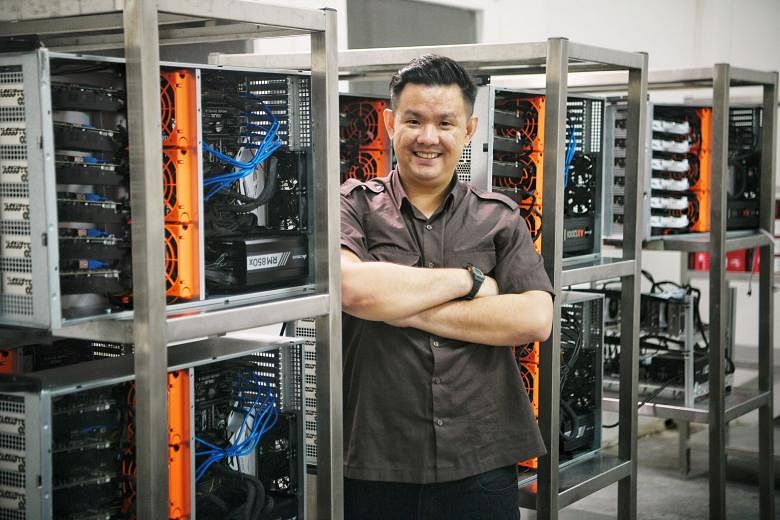Q How did you get into the world of cryptocurrencies?
A My journey dates back to 2014. I had wanted to help my farm workers, who are migrant workers from Indonesia and Bangladesh, make faster and cheaper remittances.
I read about cryptocurrencies and how powerful their underlying technologies could be, and began to mine Dogecoin (sorting through data blockchains and "releasing" the digital currency with the help of a computer, the Internet and suitable software). But the cryptocurrency ecosystem then was not as robust as it is today, so I shelved the idea. There was a lack of infrastructure, no one really understood the value of a cryptocurrency, and it was generally difficult to extract value from the digital currency into the real world.
However, some time last year, a good friend approached me about ethereum farming. We took a leap of faith and put $50,000 into buying hardware to farm ethereum on a bigger scale. My team and I set up Chi-X Online in August this year. We build data centres to host cryptocurrency mining servers, and we also mine cryptocurrencies such as bitcoin and ethereum.
Q So tell us more about Chi-X.
A The data centre business came about when we wanted to solve a major pain point - cost. The heat and noise (from servers) from mining cryptocurrencies in our own houses were too much to handle, not to mention the high electrical costs.
So we set up our own data centre in Tagore Lane to house our own wares and tackle the biggest cost component, which was electrical tariffs. I used to house a lot of our servers in Malaysia because rent and electricity are cheaper there, but it wasn't as easy as I thought. There was no consistency in terms of the electricity flow and Internet speed.
We're now working with electrical hardware providers at Socomex so that we can monitor every component that affects mining, such as the temperature of the facility, the heat of the hardware, voltage consistency, current consistency and reliability. We now have two data centres, with one more on the way, and they are all powered by home-grown renewable energy company Sunseap Energy.
Providing infrastructure is not our only focus. We also want to utilise the potential which cryptocurrency-related technology brings, through the use of digital contracts that are built on ethereum.
Clients who host with Chi-X can be charged for fees automatically and are auditable without a proxy. We are able to automate the whole payment process with the parameters of the contract preset into our coded digital contracts, so clients don't have to transfer payments to Chi-X. These transactions are also available publicly online on the blockchain and cannot be changed. All of this reduces the chance for fraud and corruption.
Q How does farming cryptocurrencies compare with what you did previously - vegetable farming?
A During my experience with agriculture farming, there were a lot of small-time farmers who were unable to access the market because of factors such as a lack of transport, or their bargaining power was often affected because they produced crops in small volumes. What I did was to provide the infrastructure to bring these farmers to market so that collectively, we have a greater say.
And the exact same thing is happening in the cryptocurrency market today. There are a lot of small miners at home, in offices, and we want to be able to tell everyone that we can band together to collectively do better work and provide better returns on investments. We are the first of our kind in Singapore and I believe that with the infrastructure that we have, we can even challenge the Chinese and Russian industries.
Q Is there still interest in cryptocurrencies? They have been associated with black markets and vice.
A Interest is still picking up. Things are very different from during the market crash back in 2014 and 2015. There are so many more applications to blockchain technology today, there is more activity in the space, and cryptocurrencies are slowly gaining credibility as merchants adopt their use. I have friends who use cryptocurrencies to buy their daily necessities as there are now start-ups that can convert cryptocurrencies into Singapore dollars for daily use.
Increasingly, people are looking more at how the technology can be developed, rather than just the idea of profiting from cryptocurrencies. There is a growing and professional segment that is doing good work in this space to disrupt age-old industries such as finance.
We do think that a stronger framework to regulate this industry - against black markets, drugs and so on - will lend it much-needed legitimacy, but it's important that it does not stifle growth.
Q How would Chi-X grow as a business?
A We are getting offers to set up more dedicated data centres across the region and internationally - such as in Malaysia, Cambodia, Lithuania, Cyprus, Hong Kong and Australia - through a franchise or Reit (real estate investment trust) model.
Through the franchise model, our partners provide the location and we set up and manage the data centre. The beauty about technology is that we can control all our data centres remotely, from Singapore.
The Reit model comes into play when partners and interested parties group together to invest in a data centre, which then provides real equity return based on the volume of cryptocurrencies mined.
We don't have any data centres in the region yet, but we're looking to establish eight such facilities in the next year.


